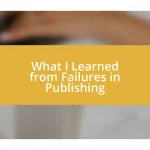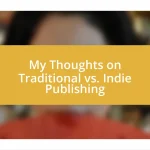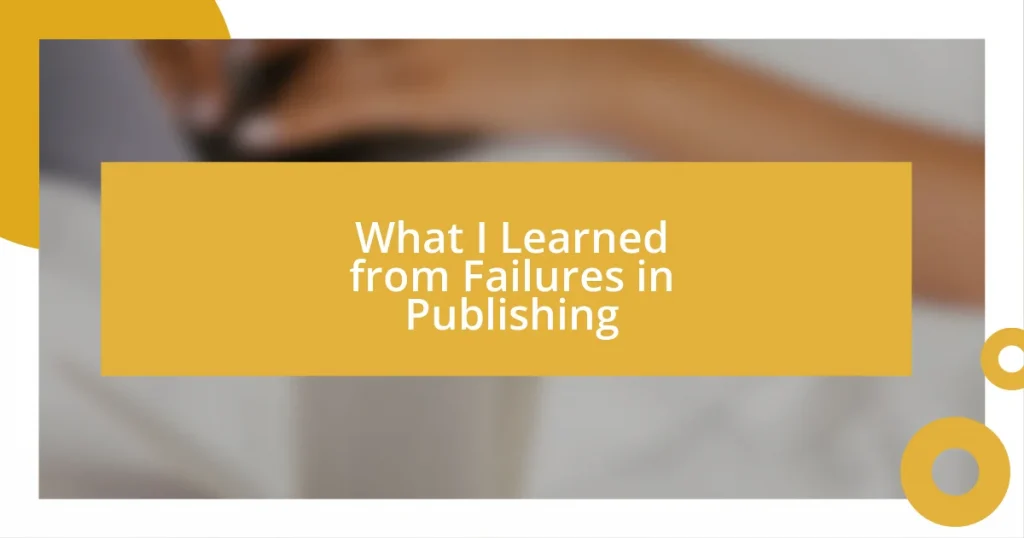Key takeaways:
- Embrace failures as opportunities for growth; they often teach resilience and inspire critical self-reflection.
- Key reasons for publishing failures include inadequate market research, poor editing, and lack of marketing strategy.
- Building a supportive community and accepting feedback are essential for overcoming setbacks and achieving future publishing success.
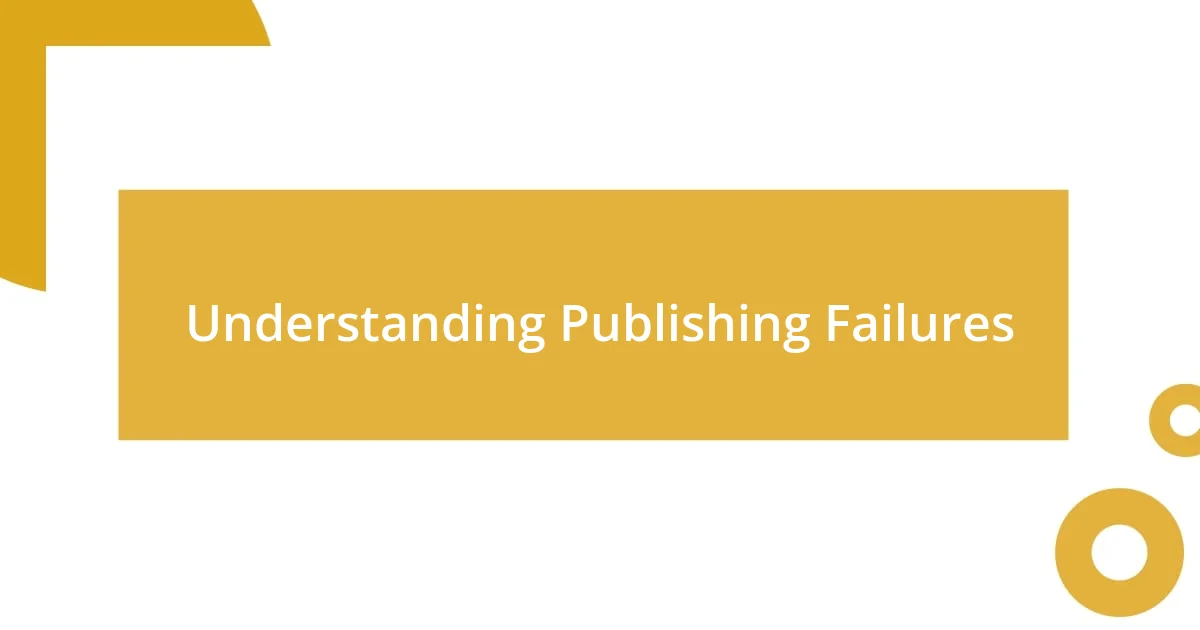
Understanding Publishing Failures
Understanding publishing failures can often feel like navigating a labyrinth. I remember my own experience vividly when a manuscript I had poured my heart into was rejected multiple times. Each rejection stung, and I found myself questioning whether my voice mattered at all. Isn’t it fascinating how our failures can sometimes lead us to profound self-reflection?
When we fail in publishing, it’s not just about the work itself; it’s about the emotional journey that accompanies it. I once received feedback that my writing lacked clarity, and while it initially devastated me, it turned out to be a blessing in disguise. It pushed me to refine my craft, prompting the question: aren’t our setbacks often the best teachers we could ask for?
Ultimately, embracing publishing failures requires a shift in perspective. Instead of viewing them as dead ends, I’ve learned to see them as valuable stepping stones. How do you respond to failure? For me, it’s about resilience—each stumble in the publishing process is just another opportunity to grow, adapt, and ultimately succeed.
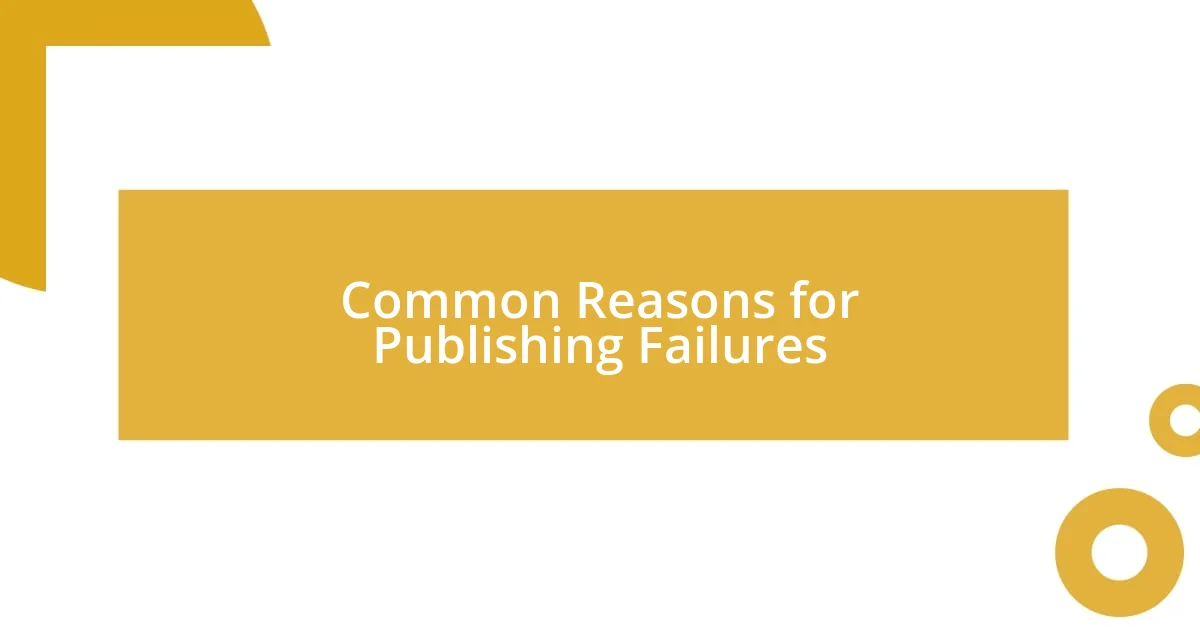
Common Reasons for Publishing Failures
Publishing failures can often stem from several common pitfalls. One major issue is inadequate market research. Early in my career, I launched a book that I believed was groundbreaking, only to discover it catered to a dwindling audience. It was a tough lesson—knowing your target market is essential. Ignoring this can lead to a complete mismatch between your work and what readers are actually seeking.
Another frequent reason for failure is poor editing. I remember submitting a manuscript that brimming with potential but riddled with typos and grammatical errors. The response was swift and harsh; editors don’t have the time or patience for poorly polished work. I can’t stress enough how crucial it is to invest in a solid editorial process. A well-edited manuscript not only enhances readability but also helps present you as a professional.
Lastly, lacking a strong marketing strategy can sink a promising title before it even sets sail. I once published a beautifully designed book and then did little to promote it. To my dismay, it barely sold. Had I focused on building a marketing plan, my story might have reached countless readers. Reflecting on these failures illuminates the path toward future success—what steps will you take to avoid similar missteps?
| Reason for Failure | Description |
|---|---|
| Inadequate Market Research | Not understanding your target audience can lead to publishing a book that doesn’t resonate. |
| Poor Editing | A manuscript filled with errors can deter editors and readers alike. |
| Lacking a Strong Marketing Strategy | Failure to promote your work effectively can result in low visibility and sales. |
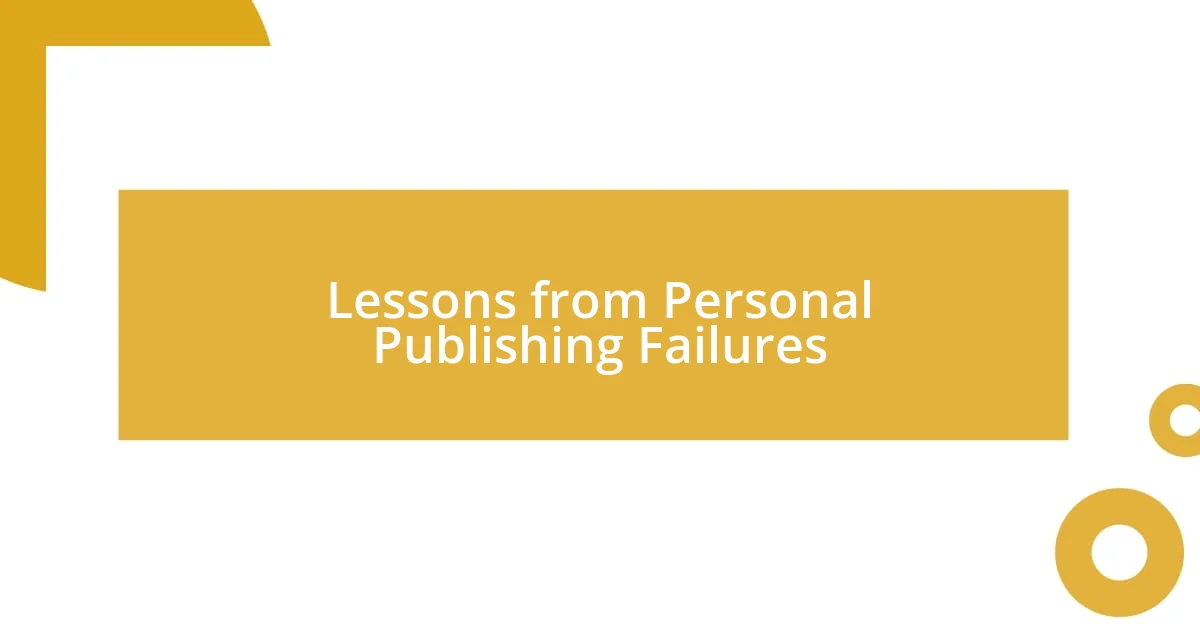
Lessons from Personal Publishing Failures
When I think about my personal publishing failures, I often reflect on the immense lesson of persistence. A particular manuscript I adored received a string of rejections, which felt like repeated blows to my creative confidence. But it was during this challenging time that I came to understand the importance of continuous improvement. Failure forced me to dissect my work critically, leading to unexpected clarity and growth in my writing.
- Accept criticism as a tool for growth; it can help you see your work from different angles.
- Understand that setbacks are not judgments on your talent but opportunities to refine your skills.
- Remind yourself that many successful authors faced numerous failures before their breakthrough, which can be incredibly motivating.
Navigating my failures in the publishing world has taught me that authenticity is crucial. I once published a short story that was too derivative, trying to fit a popular trend instead of being true to my voice. The response was underwhelming, and it hit hard. Since then, I’ve committed to writing stories that resonate with me, even if they don’t seem like they’ll be instant bestsellers. Embracing authenticity is liberating and connects better with readers.
- Prioritize writing from your unique perspective; your voice is what sets you apart.
- Evaluate why certain projects fail—did you stray from your authentic style?
- Engage with your audience; their feedback can guide you back to your core voice.
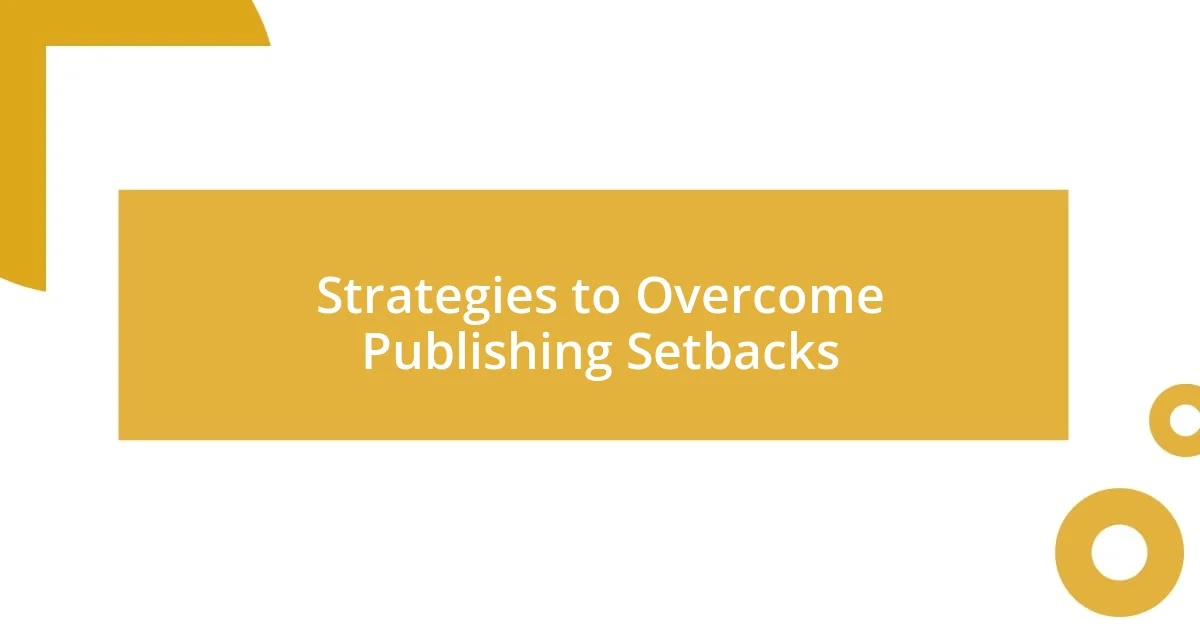
Strategies to Overcome Publishing Setbacks
One effective strategy I’ve found for overcoming publishing setbacks is to establish a solid support network. I recall a time when my confidence was shaken after a particularly brutal critique of my work. Instead of sulking in isolation, I reached out to fellow writers who shared their own experiences of rejection and recovery. This helped me see that setbacks are part of the journey. Surrounding myself with like-minded individuals who understood my struggles became a cornerstone for my resilience.
Another practical approach is to constantly refine your craft through education. I’ve invested time in workshops and writing courses, learning not just from my mistakes, but also from the triumphs of others. Each new skill I acquired made me feel more equipped to tackle future challenges. Isn’t it amazing how much we can grow when we open ourselves to learning? When I began to embrace this mindset, my writing evolved significantly, making setbacks feel less like defeats and more like stepping stones.
Lastly, I’ve learned to treat failures as valuable data points. A project that doesn’t meet expectations can reveal insights that guide future efforts. For instance, after one book flopped due to lackluster marketing, I analyzed the entire process—from targeting to promotion—and discovered gaps I hadn’t considered. Embracing this analytical mindset not only aids in overcoming setbacks, but it also empowers you to approach each new opportunity with a clearer strategy. Have you ever thought about how valuable those lessons can be if we take the time to reflect on them?
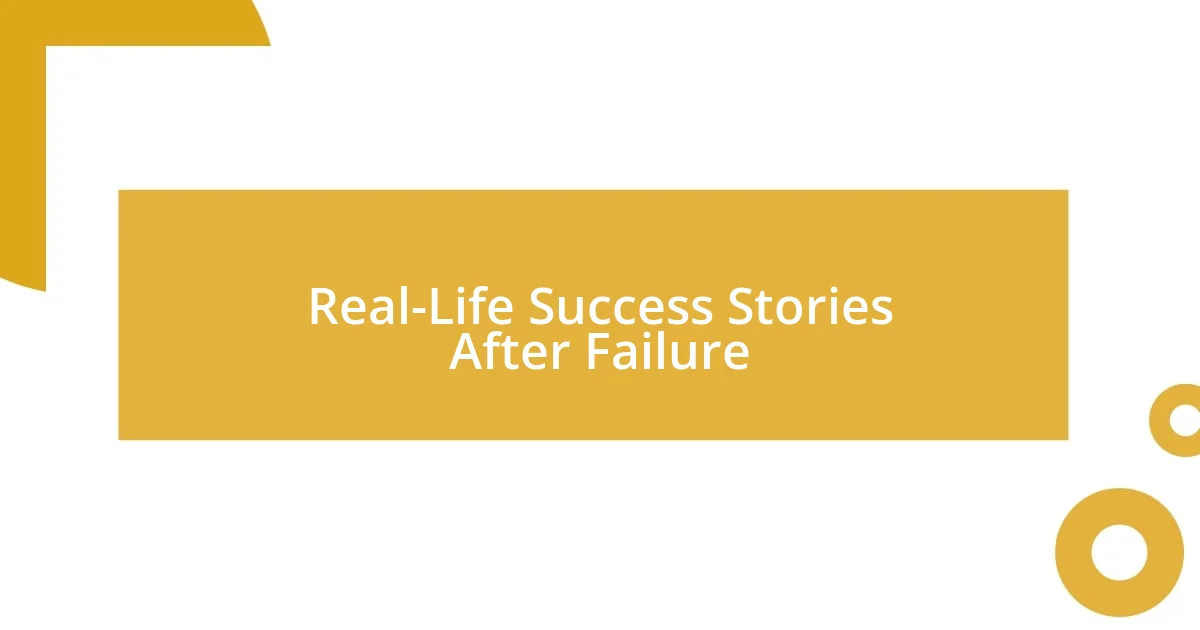
Real-Life Success Stories After Failure
I remember hearing about J.K. Rowling’s journey before “Harry Potter” became a global phenomenon. She faced rejection from multiple publishers, each one a serious setback. Yet, instead of giving up, she used that feedback to refine her story, ultimately leading to the creation of a beloved series. Isn’t it extraordinary how failure can sometimes be the catalyst for tremendous success?
Another inspiring example is the renowned author Stephen King. His early manuscript, “Carrie,” was famously rejected numerous times. After that, he almost tossed it away, but his wife, Tabitha, encouraged him to keep pushing forward. When “Carrie” finally found its home with a publisher, it launched King’s prolific career. It’s a poignant reminder that support and resilience can turn failure into an unimaginable success.
Consider Tom Peters, a famous business author, who once had a book that completely flopped. He described it as a “glorious failure” that helped him pivot his focus towards the topics that truly ignited his passion. This setback led him to create works that became bestsellers, rich with insights that resonated with readers. Reflecting on his experience, I can’t help but ponder whether our greatest lessons often come from our biggest disappointments.
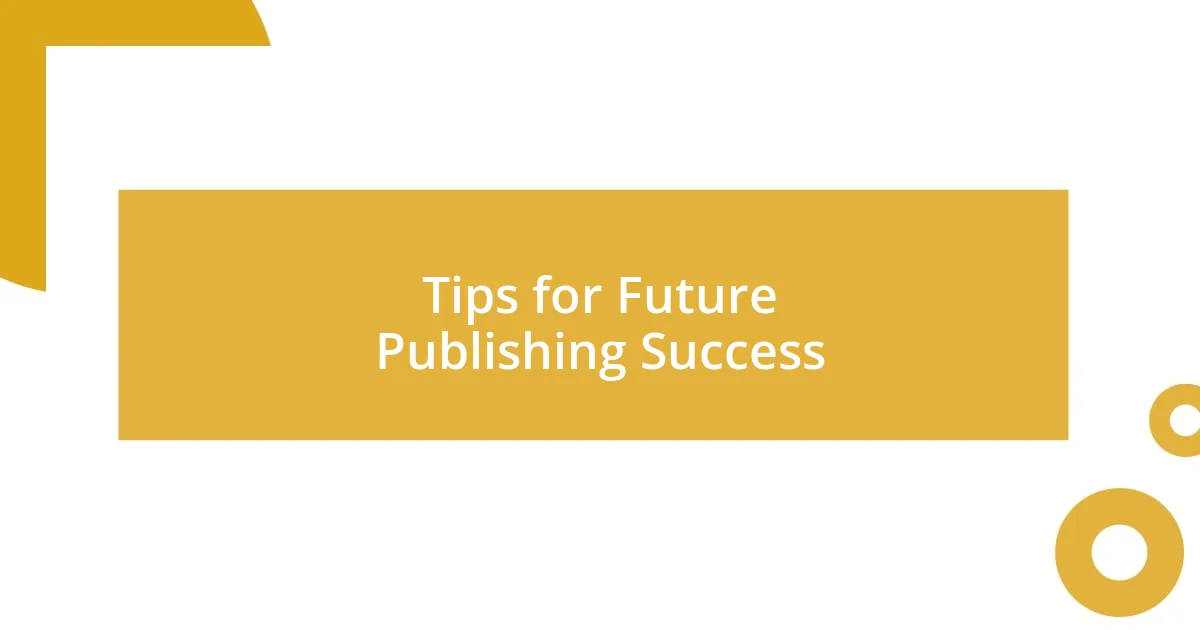
Tips for Future Publishing Success
One of the most valuable tips I can share is to embrace feedback, even when it stings. I remember submitting a piece to a literary magazine that I was incredibly proud of. The rejection came with feedback that felt like a punch to the gut. However, after taking a step back, I realized the suggestions were spot on. This experience taught me that constructive criticism doesn’t diminish my talent; instead, it sharpens it. Have you ever considered how feedback, even when tough, can be some of the best guidance we receive?
Another essential strategy is to set realistic deadlines and goals. Early in my publishing journey, I aimed to finish my manuscript in a matter of weeks. The pressure was immense, and the quality suffered because I rushed through it. After that experience, I learned to break my writings into manageable segments with flexible timelines. This shift allowed my creativity to flourish without the weight of unrealistic expectations. Do you think scheduling could possibly be the key to unlocking your writing potential?
Lastly, don’t underestimate the power of building an engaged community. I once participated in a local writers’ group, and it transformed my approach to publishing. Sharing my struggles, celebrating small wins, and learning from other members’ insights made the journey feel less isolating. We each have unique experiences to contribute, and it’s often in these shared stories that we find the inspiration to keep going. How have you connected with others in your writing journey?
